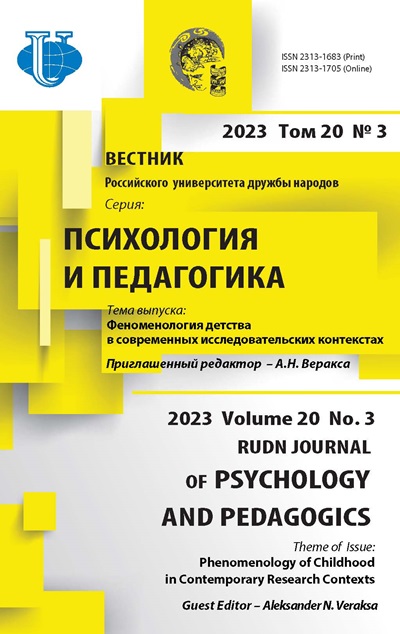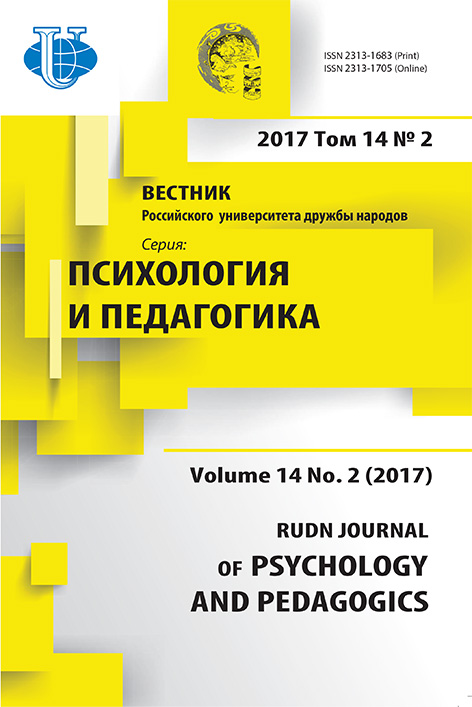THE RELATIONSHIP BETWEEN PSYCHOLOGICAL CHARACTERISTICS OF THE ATTITUDE TO THE DISEASE, COPING BEHAVIOR OF PATIENTS WITH ISCHEMIC HEART DISEASE, AND THEIR COGNITIVE STATUS
- Authors: Solodukhin A.V1,2, Bezzubova V.A1, Kuhareva I.N1, Inozemtseva A.A1, Seryy A.V2, Yanitskiy M.S2, Trubnikova O.A1, Barbarash O.L1
-
Affiliations:
- Research Institute for Complex Issues of Cardiovascular Diseases
- Kemerovo State University
- Issue: Vol 14, No 2 (2017)
- Pages: 178-189
- Section: Articles
- URL: https://journals.rudn.ru/psychology-pedagogics/article/view/15978
- DOI: https://doi.org/10.22363/2313-1683-2017-14-2-178-189
Cite item
Full Text
Abstract
The paper presents the study of the relationship between the attitude to the disease, coping behavior of patients with coronary heart disease prior to coronary bypass grafting (CABG), and indicators of cognitive status. Bekhterev Institute Personality Questionnaire, Ways of Coping Behavior test by R. Lazarus, Mini-Mental State Examination scale, Frontal Dysfunction Battery test, and Clock- Drawing test were used in the study. The sample included 132 patients. The results of study show that in patients with coronary artery disease prior to CABG the most frequently observed type of attitude to the disease is either the harmonious type or a combination of harmonious and ergopathic types. Confrontation, Distancing, and Problem Solution Planning were identified as the preferred coping strategies. Correlation analysis revealed positive associations between cognitive status and harmonious, ergopathic, and hypochondriac types of attitude to the disease, and negative associations between cognitive status and anosognostic and sensitive types of attitude to the disease. Furthermore, positive correlations between cognitive status and Confrontation, Self-control, Responsibility taking, Problem Solution Planning, Positive revaluation coping strategies and negative correlations between cognitive status and Distancing and Escape-avoidance coping strategies were found. The results of this study will help to improve the level of diagnostic and rehabilitation psychological care of patients with coronary artery disease in preparation for CABG.
About the authors
Anton V Solodukhin
Research Institute for Complex Issues of Cardiovascular Diseases; Kemerovo State University
Author for correspondence.
Email: mein11@mail.ru
лаборант-исследователь лаборатории нейрососудистой патологии Научно-исследовательского института комплексных проблем сердечно-сосудистых заболеваний (Кемерово, Россия)
Sosnovyi Blvd, 6, Kemerovo, Russia, 650002; Krasnaya str., 6, Kemerovo, Russia, 650043Valentina A Bezzubova
Research Institute for Complex Issues of Cardiovascular Diseases
Email: PerehodenkoV@gmail.com
аспирант Научно-исследовательского института комплексных проблем сердечно-сосудистых заболеваний (Кемерово, Россия)
Sosnovyi Blvd, 6, Kemerovo, Russia, 650002Irina N Kuhareva
Research Institute for Complex Issues of Cardiovascular Diseases
Email: a-kukhareva77@mail.ru
кандидат медицинских наук, научный сотрудник лаборатории нейрососудистой патологии Научно-исследовательского института комплексных проблем сердечно-сосудистых заболеваний (Кемерово, Россия)
Sosnovyi Blvd, 6, Kemerovo, Russia, 650002Anastasia A Inozemtseva
Research Institute for Complex Issues of Cardiovascular Diseases
Email: nastya060988@yandex.ru
кандидат медицинских наук, научный сотрудник лаборатории реабилитации Научно-исследовательского института комплексных проблем сердечно-сосудистых заболеваний» (Кемерово, Россия)
Sosnovyi Blvd, 6, Kemerovo, Russia, 650002Andrey V Seryy
Kemerovo State University
Email: grey@yahoo.com
доктор психологических наук, профессор кафедры социальной психологии и психосоциальных технологий Кемеровского государственного университета (Кемерово, Россия)
Krasnaya str., 6, Kemerovo, Russia, 650043Mikhail S Yanitskiy
Kemerovo State University
Email: direktorspi@kemsu.ru
доктор психологических наук, заведующий кафедрой социальной психологии и психосоциальных технологий, директор социально-психологического института Кемеровского государственного университета (Кемерово, Россия)
Krasnaya str., 6, Kemerovo, Russia, 650043Olga A Trubnikova
Research Institute for Complex Issues of Cardiovascular Diseases
Email: galet17@mail.ru
доктор медицинских наук, заведующая лабораторией нейрососудистой патологии Научно-исследовательского института комплексных проблем сердечно-сосудистых заболеваний (Кемерово, Россия)
Sosnovyi Blvd, 6, Kemerovo, Russia, 650002Olga L Barbarash
Research Institute for Complex Issues of Cardiovascular Diseases
Email: olb61@mail.ru
доктор медицинских наук, профессор кафедры кардиологии и сердечно-сосудистой хирургии, директор Научно-исследовательского института комплексных проблем сердечно-сосудистых заболеваний (Кемерово, Россия).
Sosnovyi Blvd, 6, Kemerovo, Russia, 650002References
- de Bruin, M., Sheeran, P., Kok, G., Hiemstra, A., Prins, J. M., Hospers, H. J., & van Breukelen, G. J.P. (2012). Self-regulatory processes mediate the intention-behavior relation for adherence and exercise behaviors. Health Psychology, 31(6), 695. doi: 10.1037/a0027425
- Garber, A.N. (2015). Sovladajushhee povedenie: analiticheskij obzor zarubezhnyh issledovanij. Aktual'nye voprosy sovremennoj psihologii: International Conference Proceeding (pp. 17-19). Chelyabinsk: Dva komsomol'ca Publ. doi: 10.1016/j.pec.2008.11.009.
- Garnefski, N., Kraaij, V., Schroevers, M. J., Aarnink, J., van der Heijden, D. J., van Es, S. M., ... & Somsen, G. A. (2009). Cognitive coping and goal adjustment after first-time myocardial infarction: Relationships with symptoms of depression. Behavioral Medicine, 35(3), 79-86. doi: 10.1016/j.pec.2008.11.009.
- Gureeva, I.L. (2008). Psychological Characteristic Features of Cardiology Patients with Panic Attacks. Vestnik of Saint-Petersburg State University. Series 12. Sociology, (3), 487-491.
- Hagger, M.S. (2010). Self-regulation: an important construct in health psychology research and practice. Health Psychology Review, 4(2), 57–65. doi: 10.1080/17437199.2010.503594.
- Pomeshkina, S.A. (2014). Labour ability assessment of patients undergone coronary artery bypass grafting. Complex Issues of Cardiovascular Diseases, (1), 26-30.
- Rasskazova, E.I. (2012). Samoreguljacija v psihologii zdorov'ja i klinicheskoj psihologii. Voprosy psihologii, (1), 75-82.
- Selnes, O. A., Grega, M. A., Bailey, M. M., Pham, L. D., Zeger, S. L., Baumgartner, W. A., & McKhann, G. M. (2008). Cognition 6 years after surgical or medical therapy for coronary artery disease. Annals of neurology, 63(5), 581-590. doi: 10.1002/ana.21382.
- Shtrahova, A.V. (2015). Features and Intratseptsii Internal Picture of Illness in Patients with Painful and Painless Coronary Heart Disease. Bulletin of the South Ural State University. Series: Psychology, (2), 43-58.
- Smulevich, A.B., Syrkin, D.L., Kozyrev, V.N., Drobizhev, M.Ju., Ivanov, C.B., Zelenina, E.V., Kraeva, I.K., Kubrakov, M.A, & Bevz, I.A. (1999). Psikhosomaticheskie rasstroistva: Konceptual'nye aspekty (klinika, epidemiologija, terapiya, modeli medicinskoi pomoshhi). Zhurnal Nevrologii i Psihiatrii im. S.S. Korsakova, 99 (4), 4-16.
- Solodukhin, A.V, Seryy, A.V., Trubnikova, O.A., Yanitskiy, M.S., & Barbarash, O.L. (2016). Interrelation of the cognitive status and coping behavior of patients with coronary heart disease before preparation for coronary shunting. Health and Education millennium, (6), 20-24.
- Tarasova, I.V., Trubnikova, O.A., Kuhareva, I.N., & Barbarash, O.L. (2015). Methodological approaches to the diagnosis of postoperative cognitive dysfunction in cardiac surgery clinic. Complex Issues of Cardiovascular Diseases, (4), 73-78.
- Trubnikova, O.A., Tarasova, I.V., Mamontova, A.S., Syrova, I.D., Maleva, O.V., & Barbarash, O.L. (2014). Structure of cognitive disorders and dynamics of bioelectric activity of the brain in patients after direct myocardial revascularization. Russian Journal of Cardiology, 8 (112), 38-42. doi: 10.15829/1560-4071-2014-8-57-62.
- Thostov, A.Sh. (2002). Psikhologiya telesnosti. Moscow: Mysl' Publ. 287 p.
- Wasserman, L.I., Trifonova, E.A., & Shhelkova, O.Yu. (2011). Psikhologicheskaya diagnostika i korrektciya v somaticheskoi klinike. Manual. St.Petersburg: Rech' Publ. 271 p.
















